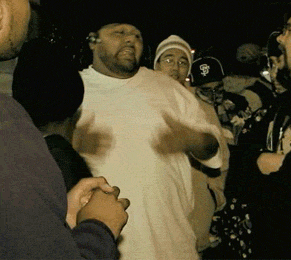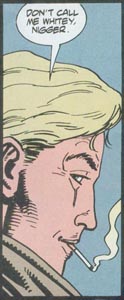
Black History Month ’09 #15: Halftime
February 15th, 2009 Posted by david brothers | Tags: black history month 2009, Colored CommentarySuperheroes were dedicated to kids for a very long time. Probably for the majority of their existence, I think. Heroes had to be true blue, respectable people. They were scientists, rich men, and reporters. Villains were bad, or evil, but not sadistic. At the end of the story, and later the issue or story arc, the villains were defeated, lessons were learned, and the status quo was resolved.
This set up a Manichean Storytelling Machine, to butcher a phrase, where good was good and evil was evil. Even the darker heroes fell into this– the Punisher, though a murderer, was portrayed as a hero above all. Ghost Rider used his hell-born power to save innocents. While there were shades of grey, these shades weren’t too far off from the norm.
This sets up a traditional story-telling style that is singularly unequipped to handle race. In fact, “handling” race is part of the approach that’s problematic in comics. It’s treating race as a problem to be fixed, a villain to conquer, or an obstacle to hurdle. It’s something you must work around and with, rather than something that informs a story.
Once this approach to race was set up, it started a snowball effect. Heroes have to beat this villain and prove racism to be evil. This is a surface-level reading and reaction to race, and one which can’t handle the complicated reality of what race really is. You have to prove something, and the length of a comic means that you’re limited to just proving that either your hero is racist or he isn’t.
Race and racism are actually much more complicated than that, and tough to get across in 22 (or 32 or 48 or 64 or 96) pages. You have to rely on being able to reduce the situation into an easily digestible bite. Making the move is a worthy effort, and it is definitely important to raise the profile of this sort of thing, but it also does the whole situation a disservice.
It’s too simple. You can’t beat racism. You can’t “e-racism,” like all the bumper stickers said in the ’90s, and which still sounds like a fancy way of saying “internet racism.” It isn’t going to go away and disappear into the ether. It’s not something that’s hard-wired, but it’s pretty close. It’s all wrapped up in nationalism, classism, and tribal thought. Our race informs our personalities, our history, and how we live in the day to day.
So, in a way, talking or complaining about race in comics isn’t swinging for the bleachers as much as it is swinging for home plate. You want to find something wrong about black people and comics? Throw a stone. You’ll find something to talk about.
This isn’t to say that we shouldn’t expect more out of superhero books. If we can tell nuanced and exciting stories about being depressed in Nebraska, the deconstruction or destruction of a superhero, entire universes being wiped out, or what it really means to be a hero, certainly we can do something similar about, or involving, race?











